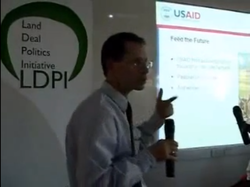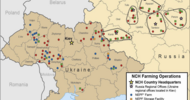
11 July 2011
Gregory Myers, Ph.D.
Senior Advisor, Land Tenure and Property Rights
United States Agency for International Development
Chair, CFS Working Group, Voluntary Guidelines for Responsible Governance of Land Tenure and Other Natural Resources
CC: Ambassador Ertharin Cousin, U.S. Representative to the United Nations Agencies for Food and Agriculture.
Dear Gregory Myers,
We, the undersigned organizations representing diverse constituencies across the United States concerned with food and agriculture, are aware of the efforts of the UN Committee on World Food Security (CFS) to address the growing problem of global large-scale land acquisitions (land grabs) in the face of deepening food, climate and economic crises. As a broad-based network of organizations dedicated to food justice, we commend the CFS on this effort and request that the Voluntary Guidelines (VGs) for Responsible Governance of Tenure of Land, Fisheries and Forests currently being drafted ensure the following:
- That the Guidelines aim first and foremost to ensure that local communities, particularly of small-scale food producers, women, indigenous peoples and the most marginalized and vulnerable populations, have priority access to and control over land, water, fisheries and forests for food production. Increasing private sector investments and economic growth is not the aim of these guidelines, nor is it the mandate of the CFS;
- That the Guidelines must recognize international human-rights obligations of States and make certain that they are respected. The U.S.A. and those few countries which are not state parties to the International Covenant on Economic, Social and Cultural Rights or other critical protections ratified by a vast majority of countries for human-rights, indigenous peoples, and biodiversity, among others, should not impede the Guidelines from referring to these obligations. Moreover, the Guidelines should help to strengthen the provisions on tenure contained in the UN Declaration on the Rights of Indigenous Peoples, particularly the provisions related to Free, Prior and Informed Consent and the rights of indigenous peoples to their ancestral lands and territories;
- That the Guidelines should make certain that any land acquisitions do not result in environmental harm;
- That the Guidelines acknowledge the natural commons, their significance for the food and livelihood security of local users and communities, and their role in the conservation of terrestrial and aquatic biodiversity;
- That the Guidelines prioritize restitution and redistributive reforms over market-oriented approaches which cannot address the crucial challenge of equitably distributing food-producing resources;
- That the Guidelines clearly distinguish the respective roles of the State, the private sector and civil society and direct States to hold the private sector accountable for the impact its investments have on rural communities and their access to land and food-producing resources;
- That the guidelines emphasize States’ obligations to properly regulate the activities of transnational corporations and other commercial entities in order to prevent negative impacts on the realization and enjoyment of human rights related to land and other natural resources by workers, nomadic pastoralists/herders, artisanal and small-scale fisherfolk, indigenous peoples and peasants.
In general, we request that the US government recognize that simply trying to make land grabs more “responsible” is not enough to address the problems of growing hunger in the Global South. Furthermore, the negative impacts of the shift towards large-scale, highly mechanized forms of agriculture that accompany the trend in land grabs need to be faced head-on if we are to combat poverty, the real cause of hunger. The powerful poverty-reducing impacts of improved land and water access for local farming communities will require specific pro-poor, access policies as well. We recognize that the US government has taken on an important responsibility in this process in assuming the chairmanship of the negotiation. US civil society will therefore be closely watching this process and reporting on what transpires.
Sincerely,
Action Aid
Agricultural Missions
America Raw Milk Producers Pricing Association
American Jewish World Service
BC Food Systems Network (Canada)
Border Agricultural Workers Project (El Paso, Texas)
Brooklyn Food Coalition
California Farmers Union
CASA del Llano
Center for Community, Democracy, and Ecology
Center for a Livable Future at the Johns Hopkins University Bloomberg School of Public Health
The Cornucopia Institute
Environmental Partnerships
Family Farm Defenders
Farmworker Association of Florida
Food & Water Watch
Food Chain Workers Alliance
Food First/Institute for Food and Development Policy
Food for Maine’s Future
Food Rights Network
Food Systems Integrity
Friends of the Earth
Grassroots Global Advocates for Justice
Grassroots International
Institute for a Sustainable Future
Institute for Agriculture and Trade Policy (IATP)
Justice, Peace, and Integrity of Creation (JPIC) Ministry
Land Loss Prevention Project
Maryknoll Office for Global Concerns
Movement Generation
National Family Farm Coalition (NFFC)
National Latino Farmers & Ranchers Trade Association
Northeast Organic Farming Association - Interstate Council (NOFA-IC)
Northeast Organic Farming Association of New York, Inc. (NOFA-NY)
Northwest Atlantic Marine Alliance (NAMA)
Nourishing the Planet (a project of the Worldwatch Institute)
Oakland Institute
Pennsylvania Farmers Union
Pesticide Action Network of North America
PLANT (Partners for the Land & Agricultural Needs of Traditional Peoples)
Progressive Agriculture Organization (PA)
SNAP Gardens
South Bronx CSA
South Central Farmers (Los Angeles, CA)
Victory Garden Initiative
WhyHunger
The Zamora Center












